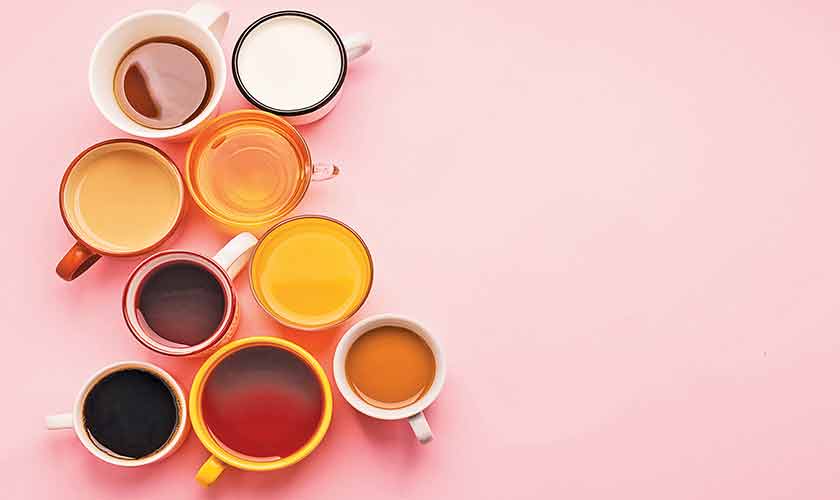This article is about a tea manager and a coffee manager; the suffix of manager can be changed to CEO, senior executive, director or any other functional rank. For immediate clarity, this is not about the purchase or inventory manager of tea or coffee. This is about the personality traits noticed of those who indulge into partaking these drinks The views are not substantiated by medical evidence or even a school of thought, but these have been formed, by this scribe, through observation of many individuals. These views hence are a limitation of my own lenses. The piece is not merely about the merits and demerits of tea and coffee drinking; it is based on observation at the corporate level experience, extending upto almost four decades.
Habit is second nature, hence, is stronger than reason. An old maxim says: Tastes in young people are changed by natural impetuosity, and in the aged are preserved by habit. As an insult to Descartes, ‘I drink coffee/tea, and therefore I am’, is the proclamation made by the indulgent.
Coffee/tea drinkers sympathise with those who don’t, because in their view, after waking up, they feel the same, all day long — sleepy and inactive. Wendall Holmes( 1891), had written, “The morning cup of coffee has an exhilaration about it which the cheering influence of the afternoon or evening cup of tea cannot be expected to reproduce”. In literature there is enough said in favour of tea, but the general thought is more inclined towards coffee, and its benefits. “Coffee, which makes the politicians (read managers/supervisors) wise, and sees through all things with his half-shut eyes”, wrote Alexander Pope.
Generally believed and supported by medical evidence is the fact that both drinks support boosting of energy levels, helps in weight management and assists in keeping the focus. The other merits associated with coffee drinking are: caffeine gives and lends support to brain health, slows down onset of risk of depression, helps clean the stomach, prevents gout, improves memory, etc. Coffee has more anti- oxidants than tea has. The flip side of its harmful effects is equally a long list: caffeine causes restlessness, tremors, insomnia, headaches, dizziness, increased heart beat (sinus tachycardia), anxiety and dehydration.
Tea originated not from our British colonial masters, they merely introduced it to South Asia, but it was in China it was discovered almost 5,000 years ago –initially used as a medicine, later it became an everyday drink — its sale brought wealth to the Chinese traders. If the British made them (Chinese) a nation of opium eaters, the Chinese took a lesser revenge, in terms of impact and intoxication, in the form of getting them into tea addiction. No Britisher (gentleman and lady) can be their royal self, without afternoon tea. Why do you think we have tea breaks in cricket, in schools, in meetings… addiction.
The benefits of tea drinking are manifold too. This aromatic drink is prepared by pouring hot or boiling water over cured or fresh leaves of Camellia Sinensis, an evergreen shrub found in China and Asia. Tea is an antioxidant too; promotes healthy blood sugar levels, boosts energy, improves lining of the stomach walls, brain functioning, its fluoride content helps in oral hygiene, helps develop immunity to many ailments.
My family has been a tea drinker for over five generations; most being part of British-India Civil Services, possibly fell for the drink to either please themselves with its many benefits or their imperialist bosses! The young today have taken to drinking coffee because the manager drinks too. Since childhood I have been a tea drinking partner to my father and siblings. Coffee is fashionable to mention, because it sounds trendy. Those who take either of the two can go into hairsplitting details, with, without, sugar, milk, the number of minutes it must simmer, etc. I am quite amused when a young professional asks for “Black Coffee”; they believe by asking for it, elevates them to the status of being an intellectual. Sad. Reminds me of my own experience.
In conversation with a very senior colleague, who was from another geographical location, than my place of posting, and to whom I did not report, but as part of inter-regional dialogue, was associated with him; in a one on one meeting, he asked, “Do you drink coffee, should I ask for a cup for you?” (since he was already drinking ). I said, “I do it only occasionally.” He then in a state of exclamation said, “God forbid, I hope you add no milk or sugar to it!”. I said, “I do.” He remarked, “how will you ever get to appreciate the bitterness of life, if you haven’t tasted bitter coffee”. He appeared so disappointed with me, for this heresy of taking coffee with sugar and milk. Readers this is the first glimpse of the personality traits that I said earlier, I have noticed in my career. Probably that the individual was a hardcore subscriber to the Turkish adage, coffee should be black as hell, strong as death, and sweet as love.
Coffee drinking supervisors/colleagues, have a short fuse. They are filled with the capacity to launch themselves into the hot and torrid zone of anger, at the drop of the hat. Their mercury levels burst through the inbuilt barometers, with no reprieve or remorse. Once in such condition, they are ruthless in conversation. After all the Katrina type of storm, the good news is, they settle down very quickly into the Pacific station — calm, as if nothing happened ever. Coffee drinking managers are wont to demonstrate very little patience to lack of quality in productivity; since by and large they are usually possessed of very high intellect and hence demand from their colleagues, significantly better response, than the average. They are extremely demanding — fly into a rage at the speed of light and are also fast to return to planet earth of reality, almost like a sparrow landing smoothly upon the branch of a tree.
The best thing I noticed about the coffee drinking supervisor and colleagues is that they are not vindictive.
Coffee drinkers have a volcanic personality. They are mostly highly intelligent, impatient to the core, stickler for details and have a visible disdain towards those who cannot cope with their speed of action.
I had a global vice president, as my supervisor, a die hard coffee drinker, who liberally and lavishly exhibited all the demerits of the drink, to their fullest at the workplace — colleagues shuddered to work with him. One morning he called a senior department dead, into his cabin (being his blue eyed, for no ostensible reason, I was witness to many “surrenders by seniors’’, in his guillotine enabled chambers), and blasted him for an error, that could be easily ignored — but no the coffee had not been served, within the first five minutes of his regal and royal arrival into the office, hence the Arctic avalanche of how could he accept shoddy work, etc. — this machine gunfire lasted only three minutes, during which, without reloading, he had exhausted a minimum of at least three magazines of lethally wounding bullets — his victim was later helped to leave the cabin, by this scribe, on his own feet! However, just under fifteen minutes later, he was rushing out for an external meeting — and the poor victim’s desk was on the pathway to the main exit door… lo! And behold, with his sweetest disarming smile spread across the two cheekbones, he waved to the victim, “Hi! Rashid, how are you?”. He had genuinely forgotten that he had only a few minutes earlier drained out all the blood out of Rashid’s veins, like a starved Dracula. (name changed for benefit of all related parties). That’s the many coffee drinking managers I have witnessed in my career — one of such a lot is so cute, he informs his secretary before leaving his residence, please have the coffee placed on my desk,… I don’t wish to be rude, confrontational and agitational with my colleagues.
Tea drinkers aren’t dumb. They too are smart and intelligent. They however are not erratic in their behaviour nor exhibit unmanageable kinetic energy boiling within them. They tend to be more patient and calm. Coffee induces tremors of hands and mind, but tea doesn’t at least of the mind. Tea drinking managers rarely fly into rage and fits. They are placid, their everyday behaviour resides in the ‘sea of tranquility’. They are adept at accepting less than brilliant people in their teams; coffee drinking managers, either maimed for life or in the extreme disfigure the personality of a report, beyond recognition. Usually an active HR function would come to the rescue and provide for a complete “corporate rehab”. It is also true that tea drinking managers take longer to forget and forgive. They do, however, late, it may be.
Both coffee/tea drinkers in moments of weakness would spend quality time of productivity, towards discussing and describing, the origins of both, the seeds or the leaves, its effects (only the positive are remembered) and more significantly, from where the coffee beans or tea leaves have been had from… they tend to get into details about, Kenyan , Sri Lankan or Bangladeshi tea leaves, while the coffee connoisseur would extoll on the coffee seeds of Brazil, Guyana or Cote’ d, Ivoire, etc. A colleague of mine used to bait and invite clients by tempting them with freshly ground and brewed coffee, made from the latest contraption of coffee making machines he had imported… his cheeks would swell with pride and happiness, whilst he would be talking of how good coffee was at his office.
Regardless of a choice between the two drinks, it is my view/opinion that no one should be addicted to anything, be it drink or any other thing, inclusive of office trappings. Tea or coffee must be had to enjoy the drink, and in limited measure, so that the many negative and Ill- effects ,it has on health and personality, are avoided.
The writer is a senior banker and a freelance columnist
https://www.thenews.com.pk/magazine/money-matters/1067980-tea-vs-coffee-manager

